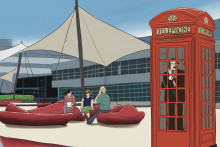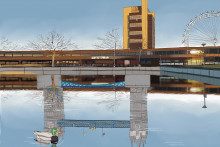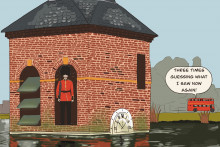‘New offensive against English-language teaching’, U-Today headlines at the end of October 2022. Once again, the association Beter Onderwijs Nederland – led by philosopher Ad Verbrugge – is responsible for introductory shelling at the use of the English language at universities. Not much later, politicians in The Hague are also awoken. While the minister of education Dijkgraaf is working on a bill on internationalization, the House is leapfrogging the minister. Dijkgraaf must hurry up with his proposal and the universities were also faced with a recruitment freeze. To top it all off, a motion from Pieter Omtzigt was added at the beginning of February to make Dutch the language of instruction for university bachelor’s programmes again.
The recent political countermovement shows once again that English speaking and internationalization are inextricably linked. Opinions differ on whether the English language was the driving force or the catalyst of this internationalization. The fact is that the intake figures have grown strongly since many UT bachelor's programmes became English-taught. In eight years, according to its own annual reports, the UT grew from almost 9,300 students in 2014 to just under 13,000 in 2021. The increase can mainly be explained by the strongly increased share of internationals in the total student population.
Growth market beyond the national borders
This growth applies to a greater or lesser extent to all Dutch universities. And here too, the upward trend was mainly caused by international students. In the 2021-2022 academic year, 115 thousand international students were enrolled in higher education. This is three and a half times as many as in the academic year 2005-2006, when 33 thousand international students were studying in the Netherlands, according to figures from the Central Bureau for Statistics (CBS).
According to critics, the funding of higher education contains a 'perverse incentive' to continue to grow. The ministry only has one proverbial pot of gold at its disposal every year. This money is distributed based on the number of students and the number of diplomas. If one university grows, the financing of the other shrinks. Because of this incentive, universities are eagerly looking for freshmen. And the growth market, it lies beyond national borders. The result: mutual competition and a strong incentive to attract students from abroad to the Netherlands. To be extra attractive to international students, universities opt for the English language.
'The rat race, that was there; if you do not grow and the other does, then your financing will decline'
There are also people in favour of internationalization. According to this group, international students contribute to the creation of an 'international classroom'. Thanks to such an international classroom, students encounter different cultures and perspectives. Excellent preparation for their later working life, according to the proponents, because students later often end up working for international companies or institutions. Foreign students also contribute to the local and national economy, especially if they stay in the Netherlands after their studies. In the case of the UT, one of the technical universities, this is especially true: there is a glaring shortage of technically trained talent in the Netherlands.
Multiple arguments
According to professor and former dean of the S&T faculty, Hans Hilgenkamp, the UT had to go along with this academic rat race. ‘Of course, the choice of language was largely motivated by the idea of being attractive to talented students from abroad. In addition, there was a mechanism in the Dutch funding system that encouraged this: the pie that could be divided among universities was only so big, you had to ensure that you secured your piece. That was indeed an incentive.’ A perverse one? ‘That depends on how you define it’, Hilgenkamp responds. ‘But the rat race, that was there; if you do not grow and the other does, then your financing will decline. So, there was enormous pressure to increase the student population – or at least to keep it on par with other universities.’
There were more arguments involved, the professor nuances. ‘It certainly did not just have a financial side. It was also: we want to be leading in our technology – for PhD positions and the labour market, we also wanted to create a curriculum with an international atmosphere, the so-called international classroom. That everyone who graduates here is familiar with an international component. That all counted. I can remember that we as deans and the programmes themselves also endorsed that importance. The discussion was mainly about the bachelor’s phase, for the master’s phase the choice of English language was obvious to everyone. What also strikes me now: to my knowledge, there has not yet been a programme that has reverted to the choice of language.’
'International staff and students are an enormous enrichment. Without them, the university would have looked very different'
Is there even a way back?
Because even though many politicians want to make universities Dutch again, is there even a way back at all? ‘We now have more than 13,000 students, a third of whom are international. That easily means thirty million euros for the UT per year. If we stop that, it will cost five hundred employees’, says University Council chairman and programme director Herbert Wormeester. ‘Then we also have to choose which sports facilities to close, which buildings to close and which programmes to continue. There will undoubtedly be rounds of dismissals and the question is whether there are enough teachers who can teach certain subjects in Dutch. In short, internationalization also means survival as universities, and that has everything to do with the financing and the unlimited access, which are characteristic of the Dutch education system.’
But Wormeester also emphasizes the nuanced picture: ‘That was not directly the goal of internationalization and the introduction of English at the UT. There were plenty of substantive arguments, such as exposing students to other cultures. At Advanced Technology, after the switch to English, more Dutch students explicitly opted for this English-taught programme. This has been the case with many more programmes and that motivates other programmes to switch as well. In my opinion, the international staff and students are an enormous enrichment. Without them, the university would have looked very different.’
'You have to see it as a whole and discuss it in an open atmosphere. The subject is still a sensitive subject within universities'
Responsibility
If Dutch universities open their doors to international students, they also have a responsibility towards this group, says Civil Engineering teacher Pieter Roos. ‘And now we are insufficiently fulfilling this responsibility. On average, international students encounter more issues, for example in the areas of housing and mental health. They are brought in by universities, while housing is not always guaranteed. Moreover, Dutch students are also faced with extra pressure on the housing market.’ According to the lecturer, the discussion about language policy cannot be viewed separately from internationalisation. ‘You have to see it as a whole and discuss it in an open atmosphere. The subject is still a sensitive subject within universities. I notice that I have to choose my words carefully.’
Things are different outside the universities, especially in The Hague. Politicians are now tumbling over each other to express their concerns about language policy and internationalisation. A motion by Member of Parliament Pieter Omtzigt on the language of instruction in education was recently adopted with a large majority. In summary, the motion states that the Inspectorate must do better in enforcing the (Dutch, unless) language legislation for higher education. After the vote, the Member of Parliament added that he wants to know ‘how to ensure that Dutch becomes the language of instruction for bachelor's programmes at the university once again because that is the aim of this motion’. This addition of Omtzigt after the vote seems a lot more radical than the original motion. The question is whether parties such as the PvdA, GroenLinks and VVD, who agreed with the motion, have interpreted it so severely. For the time being, the ball is in the court of Minister Dijkgraaf, who will soon present his plans for the internationalisation of higher education.
'Exactly because of the choice of English, the connection with the regional public has suffered. We definitely have lost something'
A rigorous intervention of the language policy will have major consequences for the UT. As is apparent from this three-part reconstruction, the Anglicisation of the university took two decades and required great efforts from the organisation. A return to Dutch will feel like turning around a container ship, because the UT has now learned to deal with English as the main language, as good and as bad as that goes, both in education and beyond. ‘Nowadays we actually just look at it very pragmatically: we make sure that we clearly communicate in our program booklet and on our website in which language a lecture is held. And of course, we discuss this beforehand with the speaker’, says Peter Timmerman of Studium Generale. ‘Accessibility also remains a difficult discussion. Perhaps a technological solution such as good subtitling software can offer solace in the future. Just like with films, everyone can follow it well, regardless of the spoken language.’
Timmerman does conclude that Studium Generale suffered some damage as a result of the switch to English. ‘We are considering offering some more Dutch talks in the future. What touches on Studium Generale's existence is that we are the platform for knowledge, and we want to share that with the region from within the university. But exactly because of the choice of English, the connection with the regional public has suffered. We definitely have lost something. But we now look very practically at the language and the target group: if a lecture is more suited to an internal audience, then it is held in English, for a regional audience we tend more towards a Dutch speaker.'
'To be truly inclusive, we may have to suffer a little and accept the differences'
Two-way street
Hilgenkamp senses a kind of equilibrium in which the UT has now arrived. ‘International students who come here want to get acquainted with Dutch culture. And that is also important for their chances in the Dutch labour market. If you ask me, it is good for international students if they also become proficient in the Dutch language in addition to their education. Just like Dutch students get to know the international atmosphere. You may certainly notice that you are studying in the Netherlands, but we also have to keep in mind that everyone is able to join the conversation at the coffee table.’
If you want to do it right, it has to be a two-way street, Hilgenkamp emphasises. ‘I still see a certain degree of segregation between Dutch and international students, for example in housing and the co-optation system that many houses use. But it is enriching to get to know different people and cultures. We should not see the language discussion in black and white, otherwise, you will get a form of us versus them-thinking. Moreover, the university should be a place where our horizons are not limited. We are bigger than Twente and the Netherlands. If you want to be an attractive place for talent from all over the world, then international students and employees are needed for our goal.’
An international university with English as the language of instruction demands dedication from both Dutch and international staff and students. Wormeester knows that too. ‘For the University Council, the switch to English took some getting used to. In the beginning, it was especially difficult with financial documents, but I notice that it is getting better. It sometimes takes effort, but we want the entire university to be able to participate.’ His conclusion: ‘To be truly inclusive, we may have to suffer a little and accept the differences.’






